文中调用FragmentTabHost的addTab将fragmentArray中Fragments加入FragmentTabHost中,
(注:fragment是以class的形式传入,在FragmentTabHost的内部会将这些fragment的类实例化)
而在initPager函数中又新建了一遍所有的fragment,并加入到ViewPager中。
因此文中存在8个fragment的实例,而这个界面往往是放在应用启动后的第一个界面,这种资源的浪费是很严重的。
解决方案在最下面
一.layout
1.main_activity_layout.xml
<?xml version="1.0" encoding="utf-8"?> <LinearLayout xmlns:android="http://schemas.android.com/apk/res/android" android:layout_width="match_parent" android:layout_height="match_parent" android:background="@drawable/wallpaper_0" android:orientation="vertical">
///主体内容页 <android.support.v4.view.ViewPager android:id="@+id/main_content_fragment" android:layout_width="wrap_content" android:layout_height="0dp" android:layout_weight="1"> </android.support.v4.view.ViewPager> <android.support.v4.app.FragmentTabHost android:id="@+id/fragment_tab_host" android:layout_width="match_parent" android:layout_height="54dp">
//这里搞不懂,加了不加效果都没变,而且也没用到它 <!--<FrameLayout--> <!--android:id="@+id/tab_content_fragment"--> <!--android:layout_width="0dp"--> <!--android:layout_height="0dp"--> <!--android:layout_weight="0" />--> </android.support.v4.app.FragmentTabHost> </LinearLayout>
2.tab_item_fragment.xml
<?xml version="1.0" encoding="utf-8"?> <LinearLayout xmlns:android="http://schemas.android.com/apk/res/android" android:layout_width="match_parent" android:layout_height="match_parent" android:orientation="vertical"> ///FragmentTabHost菜单字体和图标 <TextView android:id="@+id/tab_item_textview" android:layout_width="match_parent" android:layout_height="match_parent" android:layout_gravity="center" android:layout_marginTop="10dp" android:gravity="center" android:textColor="@drawable/tab_text_selector" android:textSize="12sp" android:textStyle="normal" /> </LinearLayout>
3.weather_tab_fragment.xml
<?xml version="1.0" encoding="utf-8"?> <!--Weather内容--> <LinearLayout xmlns:android="http://schemas.android.com/apk/res/android" android:layout_width="match_parent" android:layout_height="match_parent" android:orientation="vertical" android:background="@color/gray_background_color"> </LinearLayout>
这里有四个菜单选项,所以有四个对应的Xml,我只写了一个,其他除了文件名都一样,记得把背景颜色改了,不然都一样看不出来
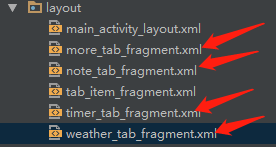
二.values
colors.xml添加
<color name="black">#000000</color>
<color name="white">#ffffff</color>
<color name="grey">#888888</color>
<color name="red">#ff0000</color>
<color name="orange_light">#ffffdd</color>
<color name="transparent">#00000000</color>
<color name="blue">#0099ff</color>
<color name="green">#00ff99</color>
<color name="orange">#F9CC12</color>
<color name="blue_light">#aaaaff</color>
<color name="tab_text_selected">#0084e8</color>
<color name="tab_text_normal">#7597b3</color>
三.drawable
1.tab_text_selector.xml
<!--选中和未选中的字体颜色-->
<selector xmlns:android="http://schemas.android.com/apk/res/android">
<item android:state_selected="true" android:color="@color/white" />
<item android:color="@color/white_trans50" />
</selector>
2.tab_weather_bg_selector.xml
<!--天气选中与未选中的图片-->
<selector xmlns:android="http://schemas.android.com/apk/res/android">
<item android:state_selected="true" android:drawable="@drawable/tab_weather_select" />
<item android:drawable="@drawable/tab_weather_unselect" />
</selector>
这里也是有四个,每个xml设置不同的状态图片样式
四.drawable-hdpi

五.java
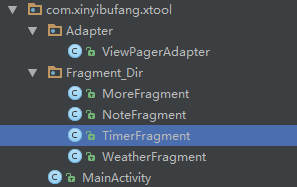
一个FragmentPagerAdapter
四个碎片
还有个MainActivity
WeatherFragment
package com.xinyibufang.xtool.Fragment_Dir; import android.os.Bundle; import android.support.annotation.Nullable; import android.support.v4.app.Fragment; import android.view.LayoutInflater; import android.view.View; import android.view.ViewGroup; import com.xinyibufang.xtool.R; /** * 作者:XinYiBuFang(心以不防) * 时间:2018/1/10. * QQ:1107786562 * 邮箱:1107786562@qq.com * 说明:XTool */ public class WeatherFragment extends Fragment { @Nullable @Override public View onCreateView(LayoutInflater inflater, @Nullable ViewGroup container, @Nullable Bundle savedInstanceState) { View view = inflater.inflate(R.layout.weather_tab_fragment, container, false); return view; } }
同样有四个对应的Fragment,注意把layout设置成不同的就行
3.SecondFragment.java
public class SecondFragment extends Fragment { @Nullable @Override public View onCreateView(LayoutInflater inflater, @Nullable ViewGroup container, @Nullable Bundle savedInstanceState) { View view = inflater.inflate(R.layout.second_fragment, container, false); return view; } }
ViewPagerAdapter(适配器)
package com.xinyibufang.xtool.Adapter; import android.support.v4.app.Fragment; import android.support.v4.app.FragmentManager; import android.support.v4.app.FragmentPagerAdapter; import android.support.v4.view.PagerAdapter; import android.view.ViewGroup; import java.util.List; /** * 作者: XYBF * 时间: 2018-01-11 10:59 * QQ:1107786562 */ public class ViewPagerAdapter extends FragmentPagerAdapter { List<Fragment> FragmentList; public ViewPagerAdapter(FragmentManager fm, List<Fragment> list) { super(fm); this.FragmentList = list; }//写构造方法,方便赋值调用 @Override public Fragment getItem(int arg0) { return FragmentList.get(arg0); }//根据Item的位置返回对应位置的Fragment,绑定item和Fragment @Override public int getCount() { return FragmentList.size(); }//设置Item的数量 }
MainActivity.java
package com.xinyibufang.xtool; import android.graphics.drawable.Drawable; import android.os.Build; import android.support.v4.app.Fragment; import android.support.v4.app.FragmentPagerAdapter; import android.support.v4.app.FragmentTabHost; import android.support.v4.content.ContextCompat; import android.support.v4.view.ViewPager; import android.support.v7.app.AppCompatActivity; import android.os.Bundle; import android.view.View; import android.view.WindowManager; import android.widget.TabHost; import android.widget.TextView; import com.xinyibufang.xtool.Adapter.ViewPagerAdapter; import com.xinyibufang.xtool.Fragment_Dir.MoreFragment; import com.xinyibufang.xtool.Fragment_Dir.NoteFragment; import com.xinyibufang.xtool.Fragment_Dir.TimerFragment; import com.xinyibufang.xtool.Fragment_Dir.WeatherFragment; import java.util.ArrayList; import java.util.List; public class MainActivity extends AppCompatActivity { private FragmentTabHost Frag_TabHost; private List<Fragment> FragmentList = new ArrayList<Fragment>(4); ///Fragment集合 private ViewPager ViewPagerControl; ///ViewPager @Override protected void onCreate(Bundle savedInstanceState) { super.onCreate(savedInstanceState); setContentView(R.layout.main_activity_layout); //背景与状态栏融合(状态栏设置透明) this.getWindow().addFlags(WindowManager.LayoutParams.FLAG_TRANSLUCENT_STATUS); Frag_TabHost = (FragmentTabHost) findViewById(R.id.fragment_tab_host); ///FragmentTabHost控件 Frag_TabHost.setup(this, getSupportFragmentManager(), R.id.main_content_fragment); ///内容界面 ///绑定对应的碎片 Frag_TabHost.addTab(GetTabView("天气", R.drawable.tab_weather_bg_selector), WeatherFragment .class, null); Frag_TabHost.addTab(GetTabView("便签", R.drawable.tab_note_bg_selector), NoteFragment .class, null); Frag_TabHost.addTab(GetTabView("计时器", R.drawable.tab_timer_bg_selector), TimerFragment .class, null); Frag_TabHost.addTab(GetTabView("更多", R.drawable.tab_more_bg_selector), MoreFragment .class, null); //添加内容碎片 FragmentList.add(new WeatherFragment()); FragmentList.add(new NoteFragment()); FragmentList.add(new TimerFragment()); FragmentList.add(new MoreFragment()); ViewPagerControl = (ViewPager) findViewById(R.id.main_content_fragment); //设置适配器 ViewPagerControl.setAdapter(new ViewPagerAdapter(getSupportFragmentManager(), FragmentList)); //设置监听ViewPager ViewPagerControl.addOnPageChangeListener(new ViewPager.OnPageChangeListener() { @Override public void onPageScrolled(int position, float positionOffset, int positionOffsetPixels) { } @Override public void onPageSelected(int position) { //设置选中 Frag_TabHost.setCurrentTab(position); } @Override public void onPageScrollStateChanged(int state) { } }); ///监听FragmentTabHost Frag_TabHost.setOnTabChangedListener(new TabHost.OnTabChangeListener() { @Override public void onTabChanged(String tabId) { ///获得FragmentTabHost选中 int position = Frag_TabHost.getCurrentTab(); // ViewPager滑动到对应的位置 ViewPagerControl.setCurrentItem(position); } }); } ///填充TabSpec private TabHost.TabSpec GetTabView(String text, int img_id) { Drawable drawable = ContextCompat.getDrawable(this, img_id); //获取图片ID drawable.setBounds(0, 0, drawable.getMinimumWidth(), drawable.getMinimumHeight()); //设置图片 View item_bar = getLayoutInflater().inflate(R.layout.tab_item_fragment, null); //实例化单个菜单 TextView tv_item = (TextView) item_bar.findViewById(R.id.tab_item_textview); //实例化TextView tv_item.setText(text); //TextView赋值 tv_item.setCompoundDrawables(null, drawable, null, null); //设置图片位置 TabHost.TabSpec spec = Frag_TabHost.newTabSpec(text).setIndicator(item_bar); //绑定TabSpec return spec; } }
六.效果
滑动切换中 切换界面
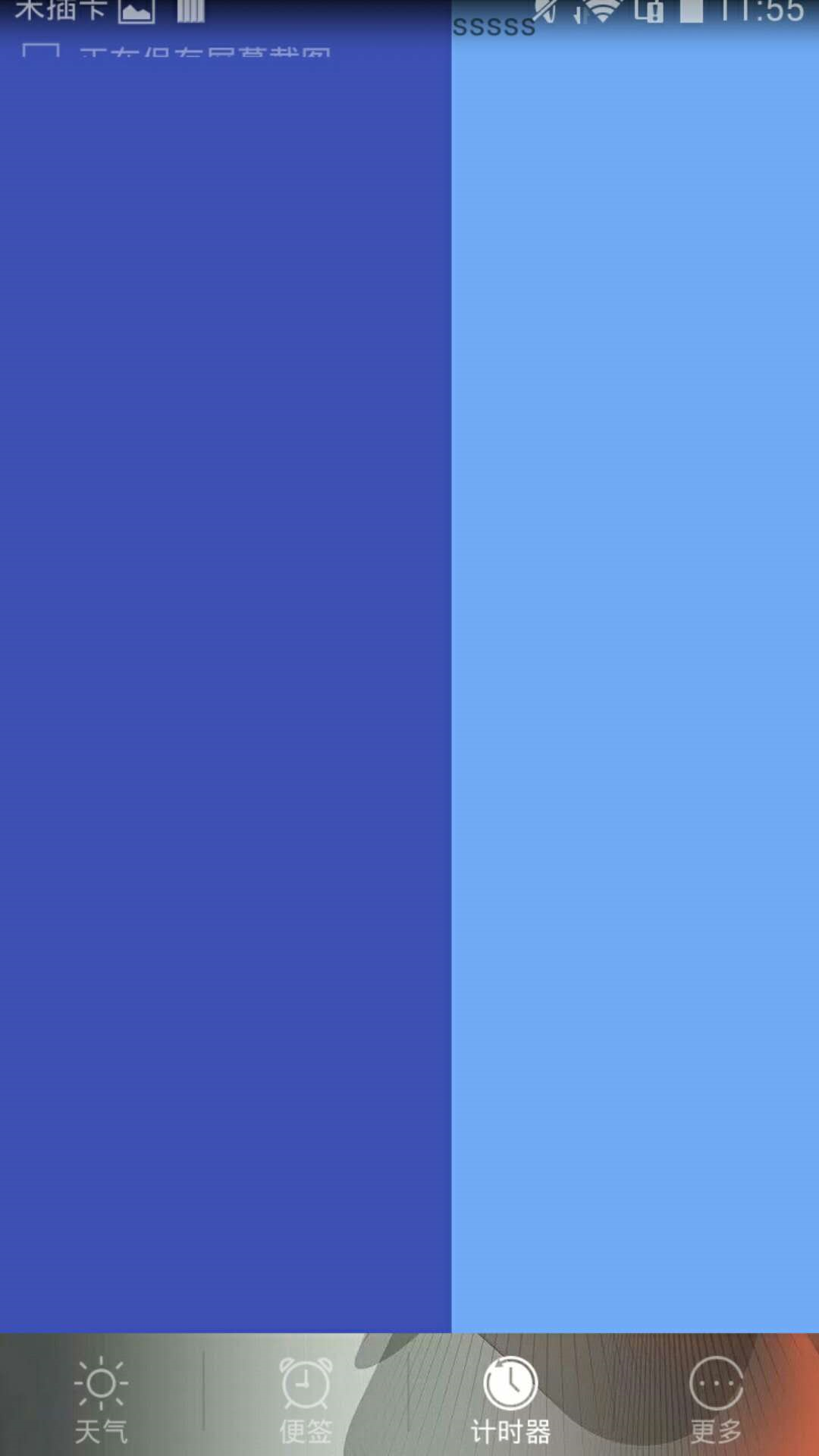
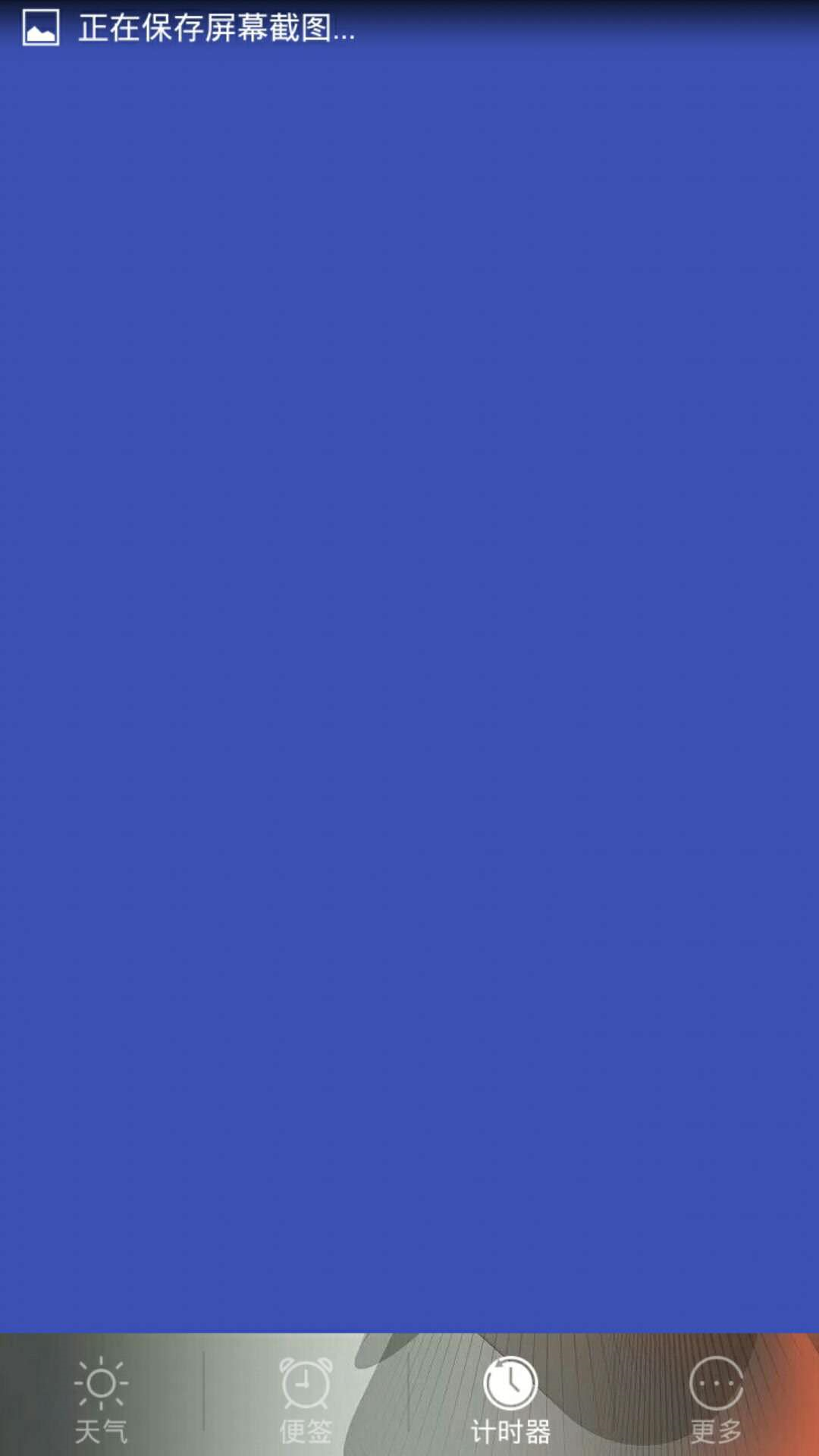

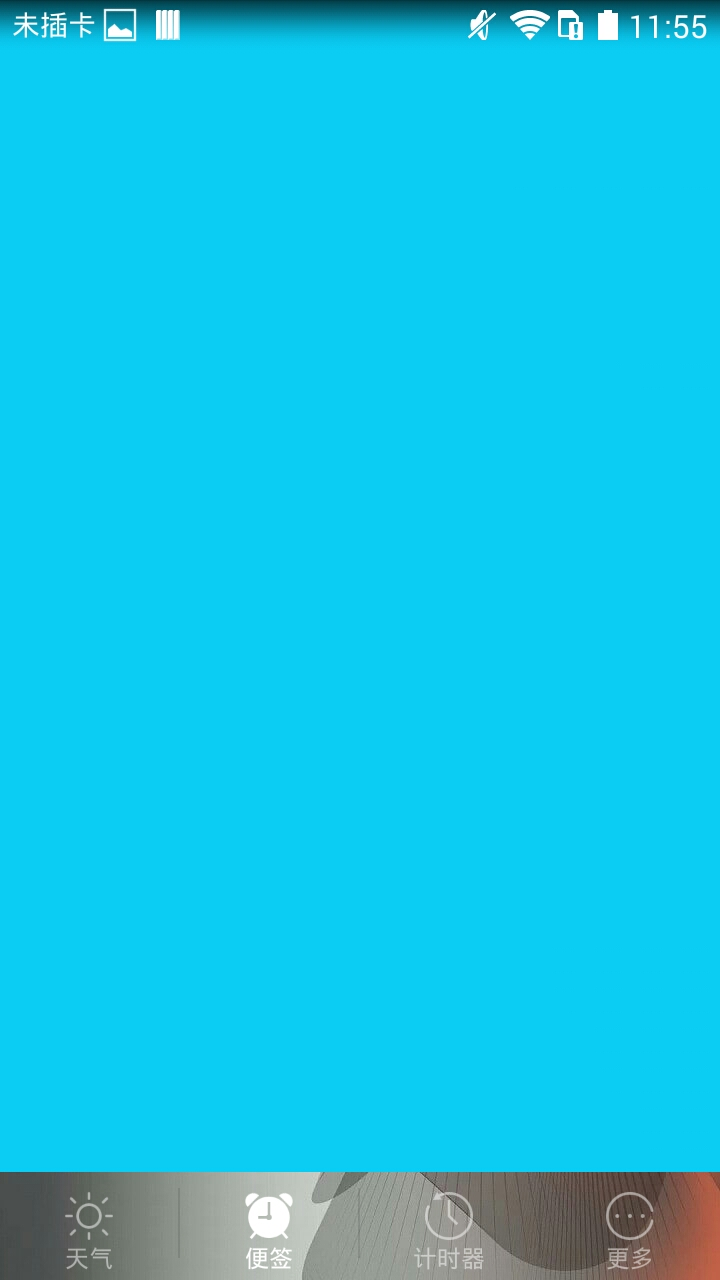
FragmenttabHost与ViewPager重复实例化 和多次onCreateView解决方案:重写FragmentTabHost
解决些问题的方向是如何做到只创建一个Fragment并切换时不走其生命周期方法
将之前要传入的Class只接改成Fragment例,我们是能做到Fragment只new一次.
在切换时是通过tag去寻找的,在原码中写的是这样,如果没有就通过反射来创建一个,这就是fragment第一次实例化的原因
用下面重写的XFragmentTabHost替换v4的FragmentTabHost
package com.xinyibufang.xtool.Adapter; /* * Copyright (C) 2012 The Android Open Source Project * * Licensed under the Apache License, Version 2.0 (the "License"); * you may not use this file except in compliance with the License. * You may obtain a copy of the License at * * http://www.apache.org/licenses/LICENSE-2.0 * * Unless required by applicable law or agreed to in writing, software * distributed under the License is distributed on an "AS IS" BASIS, * WITHOUT WARRANTIES OR CONDITIONS OF ANY KIND, either express or implied. * See the License for the specific language governing permissions and * limitations under the License. */ import android.content.Context; import android.content.res.TypedArray; import android.os.Bundle; import android.os.Parcel; import android.os.Parcelable; import android.support.annotation.NonNull; import android.support.annotation.Nullable; import android.support.v4.app.Fragment; import android.support.v4.app.FragmentManager; import android.support.v4.app.FragmentTransaction; import android.util.AttributeSet; import android.view.View; import android.view.ViewGroup; import android.widget.FrameLayout; import android.widget.LinearLayout; import android.widget.TabHost; import android.widget.TabWidget; import java.util.ArrayList; import android.content.Context; import android.content.res.TypedArray; import android.os.Bundle; import android.os.Parcel; import android.os.Parcelable; import android.support.annotation.NonNull; import android.support.annotation.Nullable; import android.util.AttributeSet; import android.view.View; import android.view.ViewGroup; import android.widget.FrameLayout; import android.widget.LinearLayout; import android.widget.TabHost; import android.widget.TabWidget; import java.util.ArrayList; /** * Special TabHost that allows the use of {@link Fragment} objects for * its tab content. When placing this in a view hierarchy, after inflating * the hierarchy you must call {@link #setup(Context, FragmentManager, int)} * to complete the initialization of the tab host. * <p> * <p>Here is a simple example of using a FragmentTabHost in an Activity: * <p> * {@sample frameworks/support/samples/Support4Demos/src/com/example/android/supportv4/app/FragmentTabs.java * complete} * <p> * <p>This can also be used inside of a fragment through fragment nesting: * <p> * {@sample frameworks/support/samples/Support4Demos/src/com/example/android/supportv4/app/FragmentTabsFragmentSupport.java * complete} */ public class XFragmentTabHost extends TabHost implements TabHost.OnTabChangeListener { private final ArrayList<XFragmentTabHost.TabInfo> mTabs = new ArrayList<>(); private FrameLayout mRealTabContent; private Context mContext; private FragmentManager mFragmentManager; private int mContainerId; private TabHost.OnTabChangeListener mOnTabChangeListener; private XFragmentTabHost.TabInfo mLastTab; private boolean mAttached; static final class TabInfo { final @NonNull String tag; final @NonNull Fragment clss; final @Nullable Bundle args; Fragment fragment; TabInfo(@NonNull String _tag, @NonNull Fragment _class, @Nullable Bundle _args) { tag = _tag; clss = _class; args = _args; } } static class DummyTabFactory implements TabHost.TabContentFactory { private final Context mContext; public DummyTabFactory(Context context) { mContext = context; } @Override public View createTabContent(String tag) { View v = new View(mContext); v.setMinimumWidth(0); v.setMinimumHeight(0); return v; } } static class SavedState extends BaseSavedState { String curTab; SavedState(Parcelable superState) { super(superState); } SavedState(Parcel in) { super(in); curTab = in.readString(); } @Override public void writeToParcel(Parcel out, int flags) { super.writeToParcel(out, flags); out.writeString(curTab); } @Override public String toString() { return "FragmentTabHost.SavedState{" + Integer.toHexString(System.identityHashCode(this)) + " curTab=" + curTab + "}"; } public static final Parcelable.Creator<XFragmentTabHost.SavedState> CREATOR = new Parcelable.Creator<XFragmentTabHost.SavedState>() { @Override public XFragmentTabHost.SavedState createFromParcel(Parcel in) { return new XFragmentTabHost.SavedState(in); } @Override public XFragmentTabHost.SavedState[] newArray(int size) { return new XFragmentTabHost.SavedState[size]; } }; } public XFragmentTabHost(Context context) { // Note that we call through to the version that takes an AttributeSet, // because the simple Context construct can result in a broken object! super(context, null); initFragmentTabHost(context, null); } public XFragmentTabHost(Context context, AttributeSet attrs) { super(context, attrs); initFragmentTabHost(context, attrs); } private void initFragmentTabHost(Context context, AttributeSet attrs) { final TypedArray a = context.obtainStyledAttributes(attrs, new int[]{android.R.attr.inflatedId}, 0, 0); mContainerId = a.getResourceId(0, 0); a.recycle(); super.setOnTabChangedListener(this); } private void ensureHierarchy(Context context) { // If owner hasn't made its own view hierarchy, then as a convenience // we will construct a standard one here. if (findViewById(android.R.id.tabs) == null) { LinearLayout ll = new LinearLayout(context); ll.setOrientation(LinearLayout.VERTICAL); addView(ll, new FrameLayout.LayoutParams( ViewGroup.LayoutParams.MATCH_PARENT, ViewGroup.LayoutParams.MATCH_PARENT)); TabWidget tw = new TabWidget(context); tw.setId(android.R.id.tabs); tw.setOrientation(TabWidget.HORIZONTAL); ll.addView(tw, new LinearLayout.LayoutParams( ViewGroup.LayoutParams.MATCH_PARENT, ViewGroup.LayoutParams.WRAP_CONTENT, 0)); FrameLayout fl = new FrameLayout(context); fl.setId(android.R.id.tabcontent); ll.addView(fl, new LinearLayout.LayoutParams(0, 0, 0)); mRealTabContent = fl = new FrameLayout(context); mRealTabContent.setId(mContainerId); ll.addView(fl, new LinearLayout.LayoutParams( LinearLayout.LayoutParams.MATCH_PARENT, 0, 1)); } } /** * @deprecated Don't call the original TabHost setup, you must instead * call {@link #setup(Context, FragmentManager)} or * {@link #setup(Context, FragmentManager, int)}. */ @Override @Deprecated public void setup() { throw new IllegalStateException( "Must call setup() that takes a Context and FragmentManager"); } public void setup(Context context, FragmentManager manager) { ensureHierarchy(context); // Ensure views required by super.setup() super.setup(); mContext = context; mFragmentManager = manager; ensureContent(); } public void setup(Context context, FragmentManager manager, int containerId) { ensureHierarchy(context); // Ensure views required by super.setup() super.setup(); mContext = context; mFragmentManager = manager; mContainerId = containerId; ensureContent(); mRealTabContent.setId(containerId); // We must have an ID to be able to save/restore our state. If // the owner hasn't set one at this point, we will set it ourselves. if (getId() == View.NO_ID) { setId(android.R.id.tabhost); } } private void ensureContent() { if (mRealTabContent == null) { mRealTabContent = (FrameLayout) findViewById(mContainerId); if (mRealTabContent == null) { throw new IllegalStateException( "No tab content FrameLayout found for id " + mContainerId); } } } @Override public void setOnTabChangedListener(OnTabChangeListener l) { mOnTabChangeListener = l; } public void addTab(@NonNull TabHost.TabSpec tabSpec, @NonNull Fragment clss, @Nullable Bundle args) { tabSpec.setContent(new XFragmentTabHost.DummyTabFactory(mContext)); final String tag = tabSpec.getTag(); final XFragmentTabHost.TabInfo info = new XFragmentTabHost.TabInfo(tag, clss, args); mTabs.add(info); addTab(tabSpec); } @Override protected void onAttachedToWindow() { super.onAttachedToWindow(); } @Override protected void onDetachedFromWindow() { super.onDetachedFromWindow(); mAttached = false; } @Override protected Parcelable onSaveInstanceState() { Parcelable superState = super.onSaveInstanceState(); XFragmentTabHost.SavedState ss = new XFragmentTabHost.SavedState(superState); ss.curTab = getCurrentTabTag(); return ss; } @Override protected void onRestoreInstanceState(Parcelable state) { if (!(state instanceof XFragmentTabHost.SavedState)) { super.onRestoreInstanceState(state); return; } XFragmentTabHost.SavedState ss = (XFragmentTabHost.SavedState) state; super.onRestoreInstanceState(ss.getSuperState()); setCurrentTabByTag(ss.curTab); } @Override public void onTabChanged(String tabId) { if (mAttached) { final FragmentTransaction ft = doTabChanged(tabId, null); if (ft != null) { ft.commit(); } } if (mOnTabChangeListener != null) { mOnTabChangeListener.onTabChanged(tabId); } } @Nullable private FragmentTransaction doTabChanged(@Nullable String tag, @Nullable FragmentTransaction ft) { TabInfo newTab = null; for (int i=0; i<mTabs.size(); i++) { TabInfo tab = mTabs.get(i); if (tab.tag.equals(tag)) { newTab = tab; } } if (newTab == null) { throw new IllegalStateException("No tab known for tag " + tag); } if (mLastTab != newTab) { if (ft == null) { ft = mFragmentManager.beginTransaction(); } if (mLastTab != null) { if (mLastTab.fragment != null) { ft.hide(mLastTab.fragment); } } if (newTab != null) { if (null == mFragmentManager.getFragments() || !mFragmentManager.getFragments().contains(newTab.fragment)) { ft.add(mContainerId, newTab.fragment, newTab.tag); } else { ft.show(newTab.fragment); } } mLastTab = newTab; } return ft; } @Nullable private XFragmentTabHost.TabInfo getTabInfoForTag(String tabId) { for (int i = 0, count = mTabs.size(); i < count; i++) { final XFragmentTabHost.TabInfo tab = mTabs.get(i); if (tab.tag.equals(tabId)) { return tab; } } return null; } }
WeatherFragment修改
package com.xinyibufang.xtool.Fragment_Dir; import android.os.Bundle; import android.support.annotation.Nullable; import android.support.v4.app.Fragment; import android.util.Log; import android.view.LayoutInflater; import android.view.View; import android.view.ViewGroup; import com.xinyibufang.xtool.R; /** * 作者:XinYiBuFang(心以不防) * 时间:2018/1/10. * QQ:1107786562 * 邮箱:1107786562@qq.com * 说明:XTool */ public class WeatherFragment extends Fragment { private View mCacheView; @Override public View onCreateView(LayoutInflater inflater, @Nullable ViewGroup container, @Nullable Bundle savedInstanceState) { //View view = inflater.inflate(R.layout.weather_tab_fragment, container, false); if (mCacheView == null) { Log.i("AAAA", "Weather onCreateView"); mCacheView = inflater.inflate(R.layout.weather_tab_fragment, null); } ViewGroup parent = (ViewGroup) mCacheView.getParent(); if (parent != null) { parent.removeView(mCacheView); } return mCacheView; } }
看一下日志,onCreateView只执行了一次,切换界面也不会多次实例化和onCreateView

源码:链接:https://pan.baidu.com/s/1dYvoPw 密码:ek4y